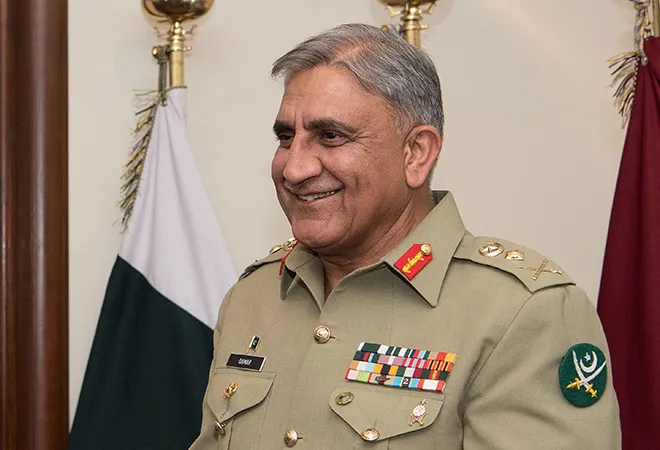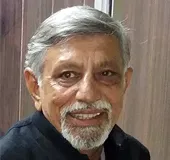-
CENTRES
Progammes & Centres
Location
Within Pakistan, it is the army which controls foreign policy towards India, Afghanistan and the US. The polity has no role. Every time the polity has attempted to take a step forward, the deep state employs terrorists to strike within India, pushing talks away.

The Pakistan army chief, General Javed Bajwa, recently briefed his senate on matters concerning national security and his recent visits, including the military alliance created by Saudi Arabia. The briefing was conducted in-camera. After the briefing, the Pak Inter Services Public Relations issued a statement containing some details. After the briefing by his staff, General Bajwa answered queries raised by some members of the senate.
It was during this interaction that he stated that the army would support the government when it went ahead seeking to improve relations with both India and Afghanistan. Such a statement, especially as it concerns India, may be the first by a Pakistan army chief (as they have mostly maintained silence on calls for talks by the government), and needs to be accepted with a pinch of salt. However, actions on supporting talks are more important than mere words.
Within Pakistan, it is the army which controls foreign policy towards India, Afghanistan and the US. The polity has no role.
Every time the polity has attempted to take a step forward, the deep state employs terrorists to strike within India, pushing talks away.
It is also abundantly clear that the Pakistan High Commissioner in Delhi reports to the army, rather than the foreign minister, and hence would always remain a stumbling block, rather than being a facilitator.
A day after the army chief spoke for reconciliation with India, he praised Hafiz Saeed, who India blames for most terror strikes, while the US has placed a bounty on him. It is only the army which is pushing for the formation of a political party, Milli Muslim League, led by him, which the government continues to object. Instead of reducing tensions along the border, it launched an operation which claimed the lives of four Indian soldiers. Thus, it is clearly a case of doublespeak, and hence India has rightfully ignored his comments.
Pakistan presently is facing international pressure. Mike Pence, the US Vice President, stated in Afghanistan a few days ago, that Pakistan is on notice to curb terror groups.
The US National Security Strategy also highlights Pakistan’s role in supporting the Taliban and Haqqani network.
It also seeks to apply pressure on Pakistan to improve its relations with India, placing the onus on it to take the first step.
Pakistan’s attempts at accusing India for supporting the Baluchistan freedom movement and anti-Pak terror groups from Afghan soil and in conjunction with Afghan intelligence agencies has no buyers, either at the UN or on any other forum where it has chosen to raise the subject. Even its demands for UN intervention in Kashmir or for implementing the defunct UN resolution on the same has been ignored. Its calls to enhance the role and mandate of the UN Military Observer Group in India and Pakistan’s (UNMOGIP) has also been brushed aside. Kashmir no longer exists on the UN agenda and has not even been discussed for decades.
On the other hand, India’s actions of naming Pakistan based terror groups backed by the deep state has received support in multiple international documents, including the BRICS summit. It has also been commented upon by many international leaders. At the UN, India, Afghanistan and Bangladesh openly blamed Pakistan for supporting terror groups. Trump and his aides have repeatedly accused Pakistan of employing terror groups as an instrument of state policy.
The US and the UN have named Pakistan based terror groups and its leaders as global terrorists.
It is only China which has saved Hafiz Saeed from being nominated as an international terrorist at the UN, by employing its veto.
Thus no one believes Pakistan or its army chief, when they make such comments. While mentioning support for talks on one hand and backing terror groups operating on Indian soil on the other, the very concept of talks has no value. Similarly, supporting Hafiz Saeed, whom India considers a mastermind of terror strikes in India in forming a political party, sends a wrong signal. Talks can never be held until terror groups operate from Pakistan soil and ceasefire violations continue unabated. For any meaningful talks there must be a conducive environment, which does not exist.
Lack of a conducive environment implies lack of trust. Lack of trust means that talks can always be derailed when the Pakistan army so desires. Hence, India feels that talks would have no value, unless Pakistan is pressured to stop support to terror groups and dismantle terror camps on its soil. Therefore, India continues to develop capabilities to counter Pakistan, which compels it to spend critical funds and enhance defence spending, which it can ill afford. Pakistan hence feels threatened and cries hoarse on India leading an arms race and increasing tensions in the sub-continent.
It feels that only by developing nuclear weapons and supporting terror groups, to tie down the Indian army in Kashmir, can it reduce Indian threat.
In the present environment, India is slowly impacting on Pakistan, what the US did to the erstwhile Soviet Union. As the US and NATO military strength continued to grow, it compelled the USSR to enhance defence expenditure, impacting its economy. Pakistan’s defence budget has been increasing by the year, compelling the government to cut down on other developmental plans, banking only on Chinese investments. It therefore would remain beholden to China.
India, on the other hand, would continue its present march of enhancing capabilities, aggressively countering cross border violations and eliminating terrorists operating in Kashmir. As a growing military and economic power, sought the world over, Pakistan would only remain a small pinprick on its side as it embraces development and growth. It is in no hurry to resume dialogue, unless Pakistan creates trust and indicates a willingness to dismantle terror groups.
Talks would benefit Pakistan more, as it could consider reducing defence expenditure and concentrate on developing its economy, which presently remains in shambles. Pakistan should learn from China, which has also realised that the way ahead with India is dialogue. Continuing its offensive path will only harm Pakistan more than India. India has nothing to lose, hence awaits Pakistan’s affirmative indicators of a desire for talks. For the present, it has rightly chosen to ignore General Bajwa.
The views expressed above belong to the author(s). ORF research and analyses now available on Telegram! Click here to access our curated content — blogs, longforms and interviews.

An alumnus of the National Defence Academy Major General Harsha Kakar is a graduate of the DSSC LDMC and the National Securities Studies Course at ...
Read More +